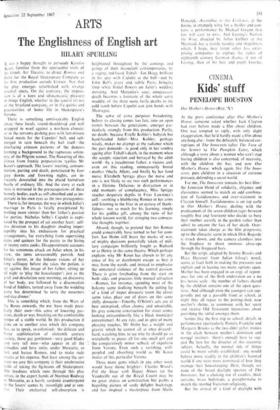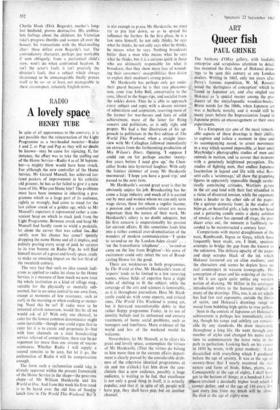Our Mother's House (Ritz, 'X')
CINEMA
Kids' stuff
PENELOPE HOUSTON
At the press conference after Our Mother's House, someone asked whether Jack Clayton had ever before made a film about children. One was tempted to reply, with only slight exaggeration, that he'd hardly made a film about anything else: from the delicately balanced cor- ruptions of The Innocents (after The Turn of the Screw) to The Pumpkin Eater, which although a story about a woman who can't stop having children is also concerned, of necessity, with the children she has; and now Our Mother's House. which again, like The Inno- cents, puts children in a situation of extreme pressure, defending a secret world.
For me, The Innocents remains his best film: the Jamesian blend of solidarity, elegance and elusiveness seemed to match an odd combina- tion of fastidiousness and over-statement in Clayton himself. Fastidiousness is on top early in Our Mother's House, dealing with the predicament of the seven children (ages between roughly five and fourteen) who decide to bury their mother secretly in the garden rather than admit to anyone the fact of her death. Over- statement takes charge as the film progresses, up to the climactic scene in which Dirk Bogarde is struck down, and the camera clambers into the fireplace to shoot ominous close-ups through the fireguard bars.
But the script, adapted by Jeremy Brooks and Haya Harareet from Julian Gloag's novel, seems at fault both in making the pressures too explicit and in leaving too many options open. Mother has been engaged in an orgy of repent- ance for sins of the flesh undertaken on a no less heroic scale -the number of fathers shared by the children remains one of the open ques- tions. And although even the youngest can sup- posedly put up a passable front at school, at night they all repair to the potting-shed, now mother's shrine, to commune with her spirit and receive Old Testament injunctions about punishing the sinful amongst them.
Sorties like the first trip to school; details in performance (particularly Pamela Franklin and Margaret Brooks as the two elder girls); ironies in the clash between mother's dominion and norn;41 instincts—there's enough here to sug- gest the lure for the director of this eccentric subject. Actually, the normal side of things could be more solidly established: one would believe more readily in the children's haunted world if one were more convinced of how they manage their housekeeping. Here, though, are none of the broad daylight spectres of The Innocents, but a choking use of candles, thick curtains, brass bedsteads. a paraphernalia to match the morbid Victorian religiosity, But the arrival of a kind of daylight with
Charlie Hook (Dirk Bogarde), mother's long- lost husband, proves destructive. His ambiva- lent feelings about the children; his Victorian rake's progress (bottles and women all over the house); his transactions with the blackmailing char : these defeat even Bogarde's tact. The contradictory character, perhaps just workable if seen obliquely, from a puritanical child's view, won't do when confronted head-on. It isn't the actor's fault, it isn't precisely the director's fault, that a subject which always threatened to be unmanageable finally proves itself to be so—or at least, not manageable in these circumspect, reticently English terms.



































 Previous page
Previous page